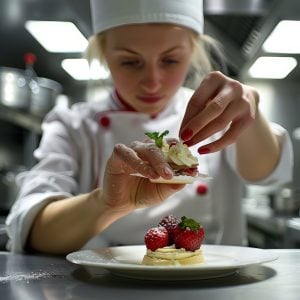Culinary or Just Some Cooking Classes – Where Should I Go?
Cooking as a hobby and as a profession has enjoyed a huge surge in popularity and prestige, thanks in large part to television networks dedicated to the art and shows designed to showcase culinary talent. As a result, opportunities to take classes to learn or hone your skills are more numerous than ever.
These programs run the gamut from stand-alone culinary schools to specific courses to teach niche skills to demonstrations at local gourmet stores. Not all classes and programs are created the same, but that is not to say that one kind is more viable than another. Your personal goals will dictate the road you choose.
I often get emails asking me about culinary schools and cooking schools. People want to know what their path should be. While it’s a subject that isn’t often discussed, enough people are confused by the vast array of culinary education opportunities out there that it’s time to look at the different types of culinary and cooking schools in depth.
Let’s examine the definitions of different culinary education labels (culinary schools, cooking schools, etc.) and examine each one’s strengths and weaknesses. Then, you can decide which path is right for you and your needs.
I want you to understand that there is no right way to meet your career goals. You must find the path that works for you. There are plenty of incredible chefs out there who never attended culinary school. In fact, they are more the rule than the exception, although culinary school graduates certainly have more of a presence in 21st-century kitchens.
Please do not think that you can’t reach your goals because of financial, time, or geographical constraints. Culinary education is not a one-size-fits-all proposition. I want you to know your options; you choose what works for you.
Culinary Schools
To be clear, I define a “culinary school” as a school that, as a stand-alone institution or as part of a chain of institutions, offers programs directly focused on the culinary or pastry arts and/or hotel and restaurant management. You can see a list of some top culinary schools in the United States listed by state here.
Not all culinary schools are created equal. Some offer diplomas. If you earn a diploma from a culinary school, it means that you have successfully mastered the curriculum and met all criteria for graduation. The classes you have taken are all focused on skills that are directly applicable to food preparation. You can earn a culinary diploma in 6 months to one year.
Other culinary schools offer Associate’s and/or Bachelor’s degrees. Earning an Associate’s or Bachelor’s degree means you have successfully mastered all the culinary skills necessary for graduation. It also means that you have completed a paid or unpaid internship or externship and demonstrated competence in nutrition, management, culinary-related math, and language courses.
Generally speaking, an Associate’s degree program lasts one to two years, and a Bachelor’s degree program can be completed in about three years.
Know that not all culinary schools hold students to the same standards. Some schools enjoy better reputations than others.
Many culinary schools also offer what are known as “Enthusiastic classes.“
These classes are designed for the home cook who may consider going into the business professionally. Enthusiast classes are also geared to passionate amateurs who want to get together, learn some new techniques, learn from a professional, and work with state-of-the-art equipment.
You will certainly learn some skills in these types of classes and come away with some recipes. Still, they are not targeted toward professionals, and the skills you learn might not be applicable in the professional kitchen.
- Pros: Prestige, top-notch culinary education, name recognition (Oh, you went to the CIA!), diploma, associate’s, and bachelor’s degrees available, depending upon the school
- Cons: Price, geographical constraints
Community Colleges and Technical Schools
Community Colleges and Technical Schools generally offer Associate’s Degree programs, although you could sign up to take just one or two cooking courses at your local CC or tech school.
Many of these schools are focused on two types of students: those who need to earn an Associate’s degree before completing a Bachelor’s degree at a four-year institution and working students who are interested in continuing education opportunities.
Not all community colleges and technical schools offer baking or culinary programs. Those that do, however, might be a viable alternative for someone interested in working in a professional kitchen. Community colleges generally charge much lower tuition than culinary schools.
While you might live hundreds of miles from the nearest Le Cordon Bleu program or a Johnson & Wales campus, you could have a community college or tech school in your town that offers culinary associate’s degrees.
- Pros: Affordability, location, Associate’s degree available, can take a couple of classes
- Cons: name recognition (You went where?), might not be available at every community college or tech school
Cooking Schools
While cooking school sounds similar to culinary school, there is a fundamental difference between the two. “Culinary schools” gear their classes to the professional (or to people who want to be professionals. “Cooking schools” are geared to teaching skills to the home cook.
That is not to say there are no schools out there that call themselves “cooking schools” that are, in fact, what I would call “culinary schools” that train individuals who are thinking of entering the food industry or are very serious about cooking.
My friend Chef Robert Reynolds has a cooking school called Chefs Studio in Portland. He trains “cooks who need to take their skills to the next level, professionals who desire renewal, and also serious home cooks who wish to learn in the traditional French manner.”
Even some professional equipment manufacturers have cooking schools. Viking owns a cooking school that caters to home cooks of all ages.
Viking Cooking School now has sixteen campuses throughout the US. Wilton has an extensive training program for amateur and professional cake decorators. Its main campus is Illinois, but Wilton offers basic and intermediate-level cake decorating classes in almost every craft store in every town in America and beyond.
Hey, wait a minute. You said cooking schools are geared toward teaching skills to home cooks. What’s this about professional cake decorators?
While cake decorating is a specialty niche in the culinary world, it is more about artistic vision, painstaking technique, and a steady hand than it is about cooking or baking. In that aspect, cake decorating doesn’t really fit into a culinary definition of cooking and baking in regard to taste, texture, ingredient function, or cooking technique.
Stand-Alone Cooking Schools
There are also stand-alone cooking schools in many cities and towns across the US. Some cooking schools are run by chefs who continue to work cooking professionally, such as in wedding or party catering.
Some cooking schools are run by people who, while not professional chefs, are exceptional cooks and want to share their love of cooking with others. Other cooking schools are geared for children and offer either after-school or weekend/summer camp-type classes.
Cooking schools offer two general kinds of classes: demonstration and hands-on. Demonstration classes are classes where the students are strictly observers. The instructor might lecture about a technique or a particular recipe and then demonstrate cooking the entire recipe from start to finish.
Students can ask questions and take notes (and possibly pictures), but they do not participate in the cooking.
In hands-on classes, there might be a short introductory lecture, but then students are thrown into a technique or recipe, learning by doing with feedback and corrections from the instructor. You have to decide which type of class works for you.
Demonstration classes might be great for someone who is a visual learner and likes to take a lot of notes but might not want to demonstrate his/her skills in front of a group. Hands-on classes are geared toward kinesthetic learners who learn by doing and moving around.
Some cooking schools offer stand-alone classes. Some offer arcs of classes lasting four to six weeks and focusing on specific skills, and some schools offer a combination of the two.
A home cook who feels confident in the kitchen but wants to learn how to bake bread could sign up for a pieces of bread class.
A new cook who knows little about cooking might sign up for an arc of classes focusing on basic cooking skills, such as knife skills and dry-heat cooking methods.
- Pros: many different schools geared to many different types of cooks, for the home cook (less intimidating), certificate of completion
Cons: Not geared toward professionals, no degrees available - Cooking Classes
Cooking classes is a catch-all. Aside from classes offered through culinary schools and cooking schools, classes might be offered at a restaurant when the kitchen is closed, at a gourmet shop or a grocery store as a demonstration, or even by local culinary clubs that might invite a chef to teach a class.
Cooking classes are most often geared toward home cooks (and potential customers, in the case of gourmet and grocery demonstrations). When I think of a cooking class, I think of a group of friends getting together for a social experience that involves cooking.
- Pros: Social interaction, learning new skills
Cons: Not geared to professionals, no degrees available
















One Response
i just graduated from Scottsdale culinary institute. i spent $27,500 to get a ‘certificate” now i am qualified to be a line cook. and earn $11 and hour. i wish i could go back in time and tell that hard sell admissions rep where to whisk it. what a waste of money. the only way to make money in this lousy business is on your own or after MANY years of experience you might make 40k. don’t do it. just be a dishwasher and learn the”line”